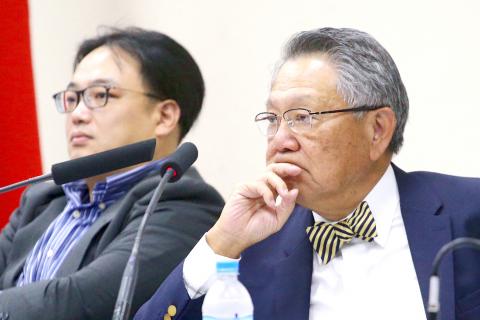Chinese Nationalist Party (KMT) Vice Chairman Steve Chan (詹啟賢) yesterday denied that “one China, with different interpretations [of what ‘China’ means]” has been scrapped in the party’s policy platform, contrary to what some KMT lawmakers have said.
Chan made the remarks in response to reporters’ questions about a dispute at Friday’s KMT caucus meeting, at which some KMT lawmakers voiced discontent over the party’s new policy platform, which was said to omit “one China, with different interpretations,” keeping only the so-called “1992 consensus.”
The “1992 consensus” — a term former Mainland Affairs Council chairman Su Chi (蘇起) admitted making up in 2000 — refers to a supposed understanding between the KMT and the Chinese government that both sides acknowledge there is “one China,” with each side having its own interpretation of what “China” means.

Photo: CNA
Chan said on the sidelines of a vote for the head of the party’s Youth League that the text “1992 consensus” and “one China, with different interpretations” are clearly stated in the preamble of the new policy platform put forward on Sept. 4, adding that it does not mean the latter part has been deleted just because it is not in the rest of the document.
When asked about strife within the party over the issue, Chan said: “What strife is there if the deletion in dispute is nonexistent?”
The “1992 consensus” and “one China, with different interpretations” referred to by Chan appear in a paragraph that delineates the party’s past endeavors to improve cross-strait ties, which “started in 2005 with former KMT chairman Lien Chan’s (連戰) trip of peace [to China] that broke the cross-strait standoff and former President Ma Ying-jeou (馬英九) maintaining the status quo according to the Republic of China [ROC] constitutional framework and reinstating cross-strait negotiations and exchanges with ‘1992 consensus’ and ‘one China, with different interpretations’ as the foundation,” according to the platform.
In the chapter titled “Policy platforms for different fields” in a section about promoting cross-strait exchanges, the platform says the “1992 consensus should be deepened on the basis of the ROC Constitution and the possibility of ending cross-strait hostility with a peace agreement should be proactively pursued.”
KMT Legislator Huang Chao-shun (黃昭順) on Friday expressed doubts about the party headquarters’ changes to the policy.
She said that the “1992 consensus” and “one China, different interpretations” are among the KMT’s “stronger arguments regarding [Beijing] in past years, so I insist that they must be there” in full.
“Sunny Snail,” the name of a group of KMT Chairwoman Hung Hsiu-chu’s (洪秀柱) young supporters, posted news reports and comments on Facebook later on Friday, accusing the KMT caucus of revealing discussions that should have been behind closed doors.
The group criticized remarks reportedly made by Huang saying the policy change would pave the way for others to “smear the party.”
Huang said if there is a problem, the group should contact her.
Additional Reporting by CNA

Conflict with Taiwan could leave China with “massive economic disruption, catastrophic military losses, significant social unrest, and devastating sanctions,” a US think tank said in a report released on Monday. The German Marshall Fund released a report titled If China Attacks Taiwan: The Consequences for China of “Minor Conflict” and “Major War” Scenarios. The report details the “massive” economic, military, social and international costs to China in the event of a minor conflict or major war with Taiwan, estimating that the Chinese People’s Liberation Army (PLA) could sustain losses of more than half of its active-duty ground forces, including 100,000 troops. Understanding Chinese

The Ministry of Foreign Affairs (MOFA) yesterday said it is closely monitoring developments in Venezuela, and would continue to cooperate with democratic allies and work together for regional and global security, stability, and prosperity. The remarks came after the US on Saturday launched a series of airstrikes in Venezuela and kidnapped Venezuelan President Nicolas Maduro, who was later flown to New York along with his wife. The pair face US charges related to drug trafficking and alleged cooperation with gangs designated as terrorist organizations. Maduro has denied the allegations. The ministry said that it is closely monitoring the political and economic situation

UNRELENTING: China attempted cyberattacks on Taiwan’s critical infrastructure 2.63 million times per day last year, up from 1.23 million in 2023, the NSB said China’s cyberarmy has long engaged in cyberattacks against Taiwan’s critical infrastructure, employing diverse and evolving tactics, the National Security Bureau (NSB) said yesterday, adding that cyberattacks on critical energy infrastructure last year increased 10-fold compared with the previous year. The NSB yesterday released a report titled Analysis on China’s Cyber Threats to Taiwan’s Critical Infrastructure in 2025, outlining the number of cyberattacks, major tactics and hacker groups. Taiwan’s national intelligence community identified a large number of cybersecurity incidents last year, the bureau said in a statement. China’s cyberarmy last year launched an average of 2.63 million intrusion attempts per day targeting Taiwan’s critical

AGING: As of last month, people aged 65 or older accounted for 20.06 percent of the total population and the number of couples who got married fell by 18,685 from 2024 Taiwan has surpassed South Korea as the country least willing to have children, with an annual crude birthrate of 4.62 per 1,000 people, Ministry of the Interior data showed yesterday. The nation was previously ranked the second-lowest country in terms of total fertility rate, or the average number of children a woman has in her lifetime. However, South Korea’s fertility rate began to recover from 2023, with total fertility rate rising from 0.72 and estimated to reach 0.82 to 0.85 by last year, and the crude birthrate projected at 6.7 per 1,000 people. Japan’s crude birthrate was projected to fall below six,